SUMMARY
This is AI generated summarization, which may have errors. For context, always refer to the full article.
![[FIRST PERSON] Stories of death during the Marcos regime](https://www.rappler.com/tachyon/2020/09/exp-horrors-marcs-father-rudy-romano-September-23-2020.jpg)
After sharing an account of my arrest, torture, and imprisonment, I will now share the stories of persons close to me who were victims of Marcos’ dictatorial rule: (1) Fr Rudy Romano; (2) Victoriano Zapanta and Vicky Hatague (parish workers); and (3) Mrs Nicole Legaspi Picardal (my mother).
Fr Rudy Romando, CSsR (Redemptorist)
On July 11, 1985, Fr Rudy Romano – a fellow Redemptorist priest – was reported missing. He was active in the movement against the dictatorial regime – often speaking at rallies.
According to witnesses, he was picked up by military intelligence operatives in Cebu. A scuttlebutt I heard coming from a retired military officer was that he did not survive torture and his body was dumped somewhere.
I had known Fr Romano since I was a seminarian. He was assigned in Iligan City and I joined him for my summer mission exposure in Misamis Oriental. His disappearance was devastating to me.
Victoriano ‘Pantoy’ Zapanta and Victoria Hatague (parish workers)
On August 7, 1985, while I was having breakfast in the monastery, Efren – a parish worker — arrived. He was panting and he told me: “Father, Pantoy has been shot! He was on his way to the mission area when two men shot him.” “Where is he?” “He is on the side of the road.”
We immediately took the motorbike and sped towards Pugaan. When we arrived, I saw his body sprawled on the side of the road with holes in his head and his armpits. There were flies on his face. His white shirt was filled with blood. His bicycle was on the ground. His wife, Naty, was wailing beside him. There were tears in my eyes as I put my arms around her shoulder.
Nobody knew who killed him but we immediately suspected that this was the work of the military and Civilian Home Defense Forces (CHDF) who had threatened him several times.
Victoriano “Pantoy” Zapanta was a parish worker whom we trained and who was working with us in the Hinaplanon area. Pantoy was formerly a member of the CHDF. He had quit from the CHDF and became actively involved in the local Basic Ecclesial Community as a Kaabag – a lay liturgical leader. Later, he was recruited and trained as a parish worker when we conducted the parish mission in Iligan City.
The funeral of Pantoy turned into a protest march attended by over 4,000 people from the mission areas carrying placards and streamers. His bicycle and bloodied white shirt were brought before the altar as a symbolic offering during the funeral mass concelebrated by 14 priests. Pantoy was hailed as martyr. But his former CHDF companions regarded him a traitor.
We were shocked by Pantoy’s brutal death. At that time we had not recovered from Victoria “Vicky” Hatague’s death. Just several months before, Vicky, a parish worker of Jimenez whom we trained earlier during the parish mission, was shot to death by the CHDF.
These tragic events weighed heavily on us. We were not surprised when Alvin, one of the Redemptorist seminarians who was on exposure with the mission team, left hurriedly without informing us. He couldn’t bear the pressure.
In spite of the harassment, we continued our mission work. It was difficult to evangelize and organize the people because the military kept telling them that we were subversives. Consequently, our approach became liturgical-centered. We also used some of the methods of the traditional mission. We focused on popular religious practices and organized mass weddings for the mancibados – couples living as husband and wife without the benefit of the sacrament of marriage. It was very difficult to hold Bible-reflection in the homes because of the black propaganda against us.
Mrs Nicole Legaspi Picardal (my mother)
On December 16, 1985, my mother was killed. A bullet pierced her head and brain. According to eyewitnesses, 3 armed men accosted her while she was on her way to the rice mill. She had just come back from the bank. They grabbed her bag, pushed her down the canal, and then shot her. The killers fled onboard a car.
She was still alive when I arrived in the emergency room. Blood was oozing from her head. She was gasping as I helplessly watched her die. All I could do was to anoint her and entrust her to God’s loving care. She died at exactly 3 o’clock in the afternoon.
Frs Ramon Fruto and Louie Hechanova, stood beside me and touched my shoulder. Ramon asked me if I was okay. I went out of the hospital without feeling anything – no anger, no sadness, no sorrow. I could not cry. My main worry was how to break the news to Papa. I immediately went home and told him what happened. He started crying, calling out Mama’s name. I put my arms around his shoulder. Dr Yañez and Aunt Sally arrived and took his blood pressure. It was 200/100. They were worried that he might have a stroke. They gave him some medication and stayed behind to console him.
Late in the afternoon, I went to the funeral parlor. Mama’s body was on the table in the morgue. The embalmer told me that they had to wait for a few hours before embalming the body and placing it in the coffin. So, I was left all alone for half an hour gazing at Mama’s body. Her face looked serene in spite of the bullet hole on her head. I came closer and kissed her forehead.
When I went back to the monastery, Luting, a leader of the Charismatic movement expressed her condolence and told me: “It’s God’s will. You’ll have to accept the will of God.” I answered her, “No, I don’t think it is God’s will.” I was simply revolted by the idea that Mama’s death was God’s will. I just could not accept this kind of theology.
On January 24, 1986, we celebrated the 40th day after Mama’s death. Many came to pray and celebrate with us. It was our final good bye. Papa told me that the men who killed Mama had recently been identified and all of them were killed by the police during a shootout. They were all part of a gang composed of Philippine Constabulary soldiers who were engaged in armed robbery.
The police had received a call that there were armed men inside the house of the Delestes. The police encircled the house. They killed the 3 men and when they checked their identity they turned out to be members of the Philippine Constabulary. It was later confirmed in the ballistic tests that the .45 caliber pistol found in one of corpses was the gun used to kill Mama. My cousin Nica said that these were the same men who were hanging around the store a few days before Mama was killed.
My mother was a public school teacher, principal, and assistant supervisor who had retired. She was deeply religious, a member of the Cursillo Movement and Legion of Mary. She was recruited by Fr McHugh – a Columban priest – to be part of the Citizen’s Commission for Justice and Peace after Martial Law was declared. At the time of her death she was the treasurer of the Rice Mill co-owned with her siblings.
I was filled with disgust that the Philippine Constabulary and the Armed Forces who were supposed to serve and protect the citizens had themselves became criminals. This is what Marcos dictatorial rule had done. This is his lasting legacy – to turn a respected institution into a criminal organization. I was filled with despair and a sense of helplessness. This is the poem I wrote at that time:
An Elegy for My Mother
My heart turned to stone
as I watched you gasped
for the last time,
your eyes blank
and blood oozed from a hole in your head
made point-blank.
My eyes couldn’t even
shed a single tear.
Numb, numb, numb.
This is the only way
I could survive this madness.
What used to be mere news reports and statistics
have finally hit home.
“This is God’s will.”
Some pious people consoled me.
Praise the Lord!
But I do not believe in a God
who can mastermind the murder
of a helpless mother.
What a blasphemy
to make God the prime suspect
for the crime committed
by men who were supposed to maintain
peace and order.
This is the will of a rapacious regime
that has spawned an army
of thieves and murderers.
Mother, I just cannot imagine you
as a mere pile of dust and bones
in a dark and lonely tomb.
Mother, I can never believe
that a bullet can annihilate
everything that you have been
and will always be.
This was a dark night of the soul for me. This is what I wrote in my diary on the last week of January 1986: “These past few days, I have been plagued by doubts about my faith. I have been questioning the reality of God’s existence. Is God really real? Is He really the God who liberates the poor and oppressed? Can He really do something about our present situation? How is God present in the suffering of our people and what is He doing about it?”
I have often felt God’s absence rather than His presence in my life. Last night, as I tried to pray in the dark chapel, I expressed all these doubts and questions. Finally, I cried out: “Oh God, I’m not sure if I am talking to you or I am speaking to the wind. If you really exist, please give me a sign.”
A month later, I got my answer. Marcos was ousted peacefully by People Power. – Rappler.com
Father Amado Picardal is the executive co-secretary of the Commission for Justice, Peace, and Integrity of Creation of the Union of Superiors General in Rome.
Add a comment
How does this make you feel?
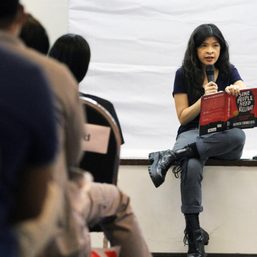

![[OPINION] ‘Some people need killing’](https://www.rappler.com/tachyon/2024/04/tl-some-people-need-killing-04172024.jpg?resize=257%2C257&crop_strategy=attention)


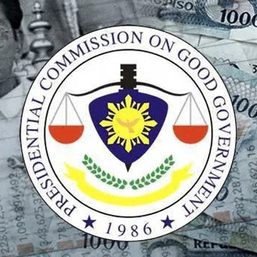
![[Newspoint] The lucky one](https://www.rappler.com/tachyon/2024/04/lucky-one-april-18-2024.jpg?resize=257%2C257&crop=536px%2C0px%2C1080px%2C1080px)
![[Just Saying] Marcos: A flat response, a missed opportunity](https://www.rappler.com/tachyon/2024/04/tl-marcos-flat-response-april-16-2024.jpg?resize=257%2C257&crop=277px%2C0px%2C720px%2C720px)
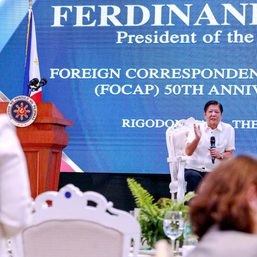
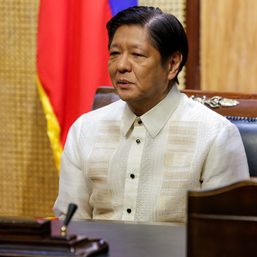
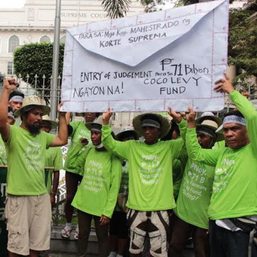
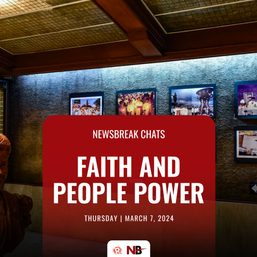
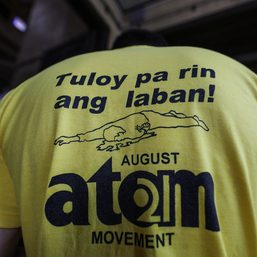
![[OPINION] What happened to laughter in February 1986?](https://www.rappler.com/tachyon/2024/02/tl-laughter-1986.jpg?resize=257%2C257&crop=346px%2C0px%2C720px%2C720px)
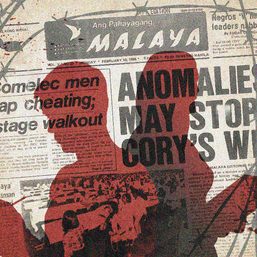
There are no comments yet. Add your comment to start the conversation.